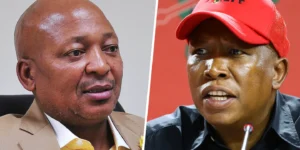By: Clyde Ramalaine
Part 001 Making Minority Representation count
‘Do not despise small beginnings’ is an ancient Biblical adage that involuntarily thrust itself on my thought provocation as I began to look at the unfolding and changing dynamics of South African politics in particular at Local Government level with the PA as a player. The political landscape is a shifting reality. While the African National Congress have boasted victories since the advent of democracy new parties were born generally small and at first glance insignificant if considered against the backdrop of the bigger political economy as a canvas.
Minority representation as a scholarly thesis holds that it strengthens representational links while fostering more positive attitudes towards government and therefore encourages political participation. The contemporary scholarship supports the idea that minorities are more fairly represented in well-drawn single-winner districts only when the minority population in question is politically homogeneous and geographically concentrated. According to Welch [1990] and Casellas [2009] in their assessments of Hispanic populations are disadvantaged in single-winner districts.
South Africa’s journey in democracy will confirm that at first there was a preoccupied focus of National Seats in Parliament for national impact however in what can be accepted as the maturing constitutional democracy gradually over the course of the last 26 years politics shifted to local government the third sphere. Local government represents the proverbial bread and butter community issues. One of the fundamental if not glaring errors the ANC as the elected leader of society committed was to neglect this in my view the most critical sphere of governance. Local government is not the add – on of government it is the epicentre of true governance because it is here where the people meets government in the nakedness of its presence or absence of service delivery.
An adumbrated history of post-settlement South minority politics is perhaps best understood in the contribution albeit regional of the late Armichand Rajbansi and his Minority Front. While Rajbansi’s politics were at first crucified as racial, irrelevant, number-wise useless and somewhat cynical the greater science behind such is perhaps today maturing in the work of the Patriotic Alliance. While periodically we have seen parties born their effectiveness of minority representation that works for its constituency are not that easily observable.
What then was the Minority Front ideology, strategy and tactics?
Rajbansi’s ideology was that minorities can and should count where it matters. Rajbansi knew that Indians in SA constitute an outright minority across any level of population designation. He understood that Indians were for the better part given the history of the advent of garment industry concentrated in what was originally Natal and under democracy became KZN. Rajbansi knew he could not outperform the ANC in numbers hence he chose to be a powerbroker with a regional prominence that could engage any political party since the results of the election from the start confirmed voting patterns that uphold race classification in the dominance of preference.
Rajbansi knew that Indians didn’t vote for the ANC and will as an intrinsic group never would. He was therefore targeting ‘his own’[ however defined] who were not willing to vote for either the ANC, National party or Democratic Party back then. His strategy details a need to create a political vehicle to carry a mandate on behalf of those who do not vote for the aforementioned parties. It is a choice in simplicity yet daring because the result was to have the power to negotiate where possible in benefit of a political and economic stake for a people that ordinarily never would have been able to earn a seat around the table of power if numbers dictated the order of business. His tactics were to meet with his people to speak their language not just figuratively but meaning he understood that Indian people speak their traditional languages [Gujarati etc.] which hail from India. He knew they had issues from a ratepayers disposition that gives them rights as enshrined in a constitution. He was willing to be labelled an exclusivist, racist, self-serving and backwards albeit by the very ANC politically connected Indian elites. There is always a price to be paid if you set out on an any meaningful cause.
The record would show that Rajbansi at critical stages of his Minority Front power-brokering went with both big and small parties and determined the outcome that was favourable for his agenda. In some instances the Minority Front was able to transpose that regional KZN support to matter at provincial and to a lesser degree national spaces since its leader leveraged the power of minority politics. I am not a fan of Rajbansi but I am an observer of a shrewd politician who in his setting purported to have understood the signs of the times.
The Patriotic Alliance around since 2013 this year celebrates 7 years of active politics in which it has fielded candidates in critical provinces and municipalities which initially shown a truculence but gradually is manifested seedling results. Seedling results is a construct I use to explain the growth in spaces that appears inorganic, crucial yet out of the ordinary in governance expression. Yes, the PA has a target market in anchor-base. It is impossible to endeavour a political agenda and programme without first identifying and publicly asserting a connectedness to particular community identity.
It is a given that the PA has representation in the Nelson Mandela Metro, Ekurhuleni Tshwane and Cape metros. Again, leadership and foresight guided by a willingness to seek counsel on the part of McKenzie saw to a very sane decision to support the DA’s Atholl Trollip when the EFF was baying for his political head. It was the subject of principle that guided McKenzie’s PA to support Trollip when race politics in wanton fashion was played with to define the canvas of politics in that neck of the woods.
Its business case for that anchor base is not merely justifiable in defensible rationale but it’s borne out by a confluence of malicious events and choices leading parties over the breadth of 26 years made that began to paint a picture on those apartheid’s Act 30 of 1950 Section C classified as Coloured. What is indisputable is that despite the African National Congress’ claim of existing for blacks in general and Africans, in particular, it has neglected a community of people in service delivery, access to opportunity for jobs, participating in the economy, equality and development. This is not a shallow complaint it can be borne out by research that evidence facts. The obsession of the ANC to uncritically adopt the apartheid lexicon of ‘African’ in exclusive sense lends itself to an appetite to discriminate, overlook and disenfranchise Coloured people as equal partners in the franchise of democracy.
While there are at least three dominant streams on identity articulation and marking for this group i.e. those who by choice reject the label in preference of the indigenous first people identity markers of Khoi San etc. Those who reject it in the principle of Biko’s black consciousness philosophy cohort and those that proudly self-identify as Coloured. For the latter, this term is not offensive and encapsulates their esteemed self-identity. What protects an undeniable commonality is regardless of how people in this classified and stratified group manifests, since 1994 a democratic state followed in the footsteps of its predecessor apartheid State and entrenched these identity markers. It is my current seminal work to argue that those labels were uncritically appropriated by democracy albeit, in their claims of redress, it holds SA carceral to the fallacy of race as a social construct with nebulous tendencies to define a long-debunked scientific presence. It inadvertently celebrates race when we all know race was not a benign construct that went awry but the very product of a racist mind.
What is indisputable is that the apartheid state-defined this group in classification and the democratic state adopted these labels without engaging this race-based identity construction praxis. Now what is inadmissible is the fact that democracy no different resulted in the same plight of disenfranchisement, economic deprivation, lack of social identity agency measurable in the equality of a common humanity for this group. It is then not strange that the colloquialism of “first-not-white -enough-now-not-black -enough “ found more than traction over the elongated period of our democratic sojourn. We know that on aggregate the Coloured male has the lowest chance of finding a job or of participating with equality in the South African economy given the inherent employment equity structural inequalities and flaws.
It is, therefore, out of necessity and duty than that the Patriotic Alliance attempts responding to this cogent reality of disempowered communities understood in frames of Coloured definition chose to raise its natural banner. In a sense, one can argue that that choice was organic since the challenges are real and the socio-economic dynamics even more prominent.
When we contend the PA’s, existence is out of necessity it is to appreciate the reality of economic disenfranchisement in manifestation akin to apartheid victims broadly defined and more specific the identity markers of Coloured. Interesting enough the emergence of the EFF sought to position itself around the identity of the economic disenfranchised black people that on closer examination attests the poor ‘African’. As in the case of the ANC that ‘African’ identity in EFF prism is uncritically accepted from an apartheid toolbox. The case thus can be made that the EFF is exclusively an ‘African’ party concerned real or not on the diaphragm of economic freedom as its raison detré While we rightfully may disagree with its politics it with almost 7% vote has captured critical spaces in our discourse as leading even the ANC. This is confirmation that small and smaller parties have since the days of Rajbansi pointed to be powerbrokers for the benefit of a particular constituency that under normal circumstances will never sit at the table of equal brotherhood.
It is in this context that the Patriotic Alliance in ontology must be understood and interpreted. While there may be a slew of challenges some may raise the contextual reality of economic disenfranchisement is arguably the central axis for its existence. It has entered and become a player in the power of minority party role in a local governance index.

Political Analyst & SARChI D.Litt.et Phil Political Science Candidate with UJ. FILE PHOTO: Supplied






